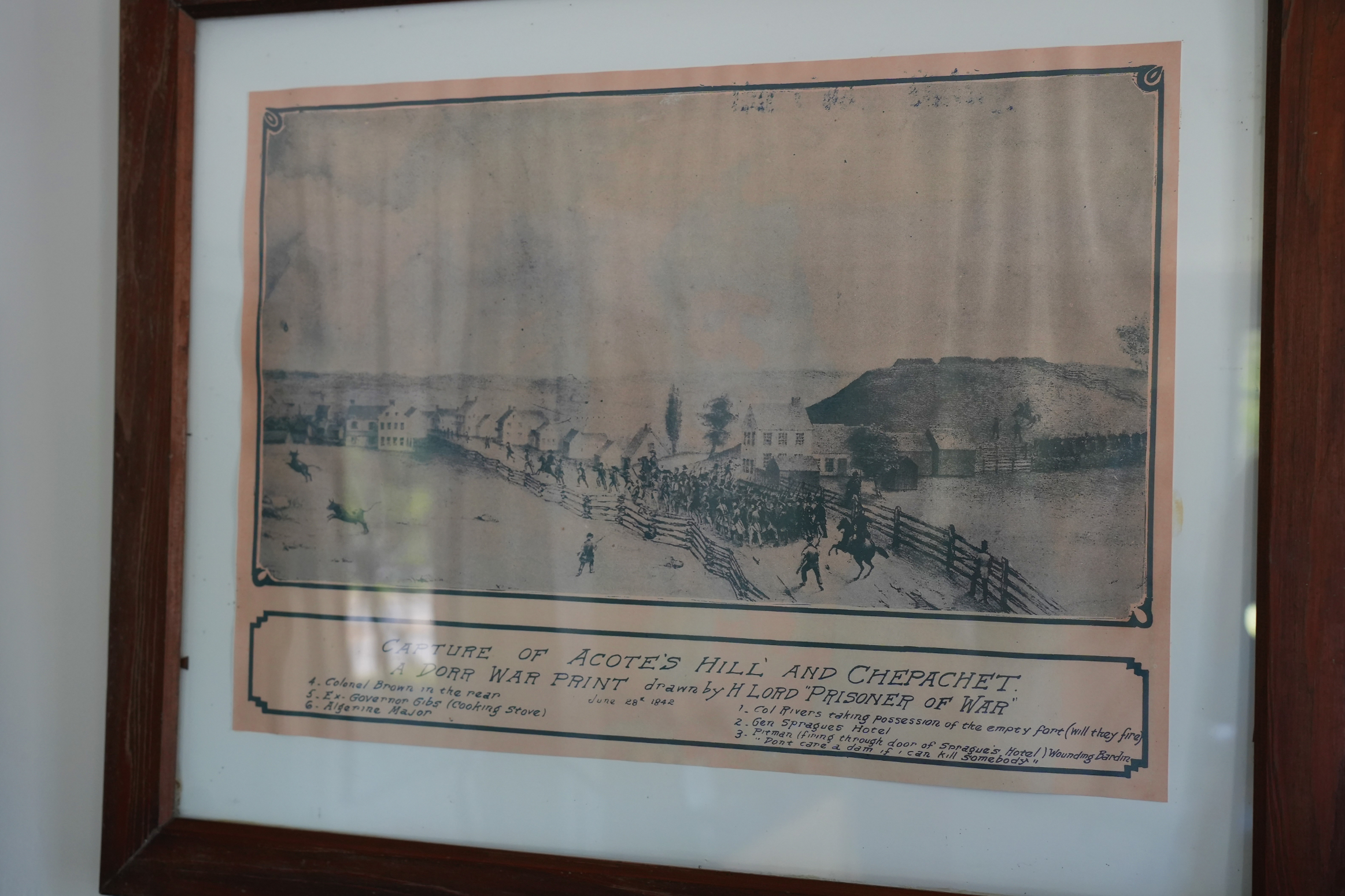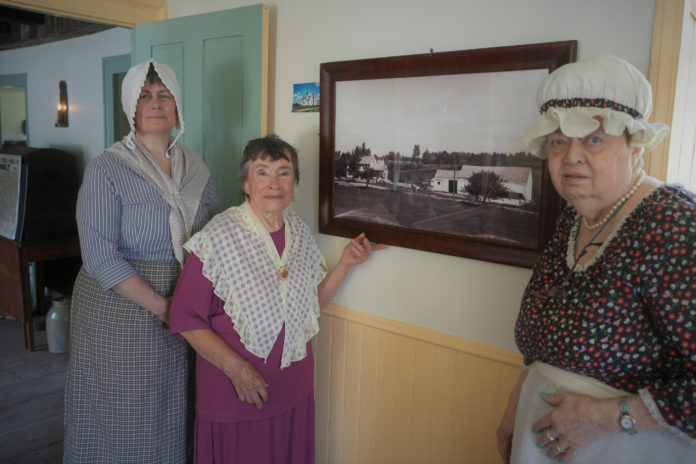GLOCESTER – At the museum at the Historic Pettingill-Mason House on Route 44 in Chepachet on Saturday, June 11, the Glocester Heritage Society celebrated the 180th anniversary of the Dorr Rebellion. Clad in historic costumes, volunteers brought the public inside the house that is the Dorr Rebellion Museum. Nancy Greene was greeting visitors; Edna Kent leading tours, and Christine Sederback was working the spinning wheel.
In Rhode Island of 1842 a rebellion occurred over the right to vote, also known as suffrage. Chepachet was right in the center of the storm. Thomas W. Dorr, long dead hero of that tumultuous time in state and world history, is not forgotten.
In 1842 the state was divided. Re-elected incumbent Governor Samuel Ward King, a Whig, was not in agreement with the ideas and leadership of Dorr regarding suffrage. Whigs were the Democrats of that era, said Marie Sweet, GHS president. Dorr was from a well-to-do Whig family.

Dorr was elected governor by the newly formed People’s Party. Therefore, the state had two governors, or only one depending on one’s perspective of the voting issue of the day.
“At the time RI was still under King George’s charter, original to the colony,” said Sweet.
As early as 1817 the Rhode Island General Assembly had, “virtually ignored,” attempts to reform voting, according to Dorr Rebellion, a 2007 booklet published for the GHS’s re-enactment.
In the 1840s, citizens rose up, bypassed the legislature, and convened their own convention.
Dorr was the leader in 1841 and wrote the People’s Constitution.
The next year he was elected governor.
Rebellious Dorr and the party advocated for the right to vote for all Rhode Island citizens over 21 years of age, at a time when only certain citizens were allowed to cast a ballot; that is, men owning at least $134 worth of land, Sweet said.
Dorr, “had supporters all over the state,” such as factory workers and also men who were sons of landowners – yet not allowed to vote although their fathers were, said Sweet.
Whig Governor King, “used force and intimidation to prevent the implementation of the People’s Constitution,” according to the Dorr Rebellion.
Responding to force and intimidation, some Dorr supporters tried to seize the state arsenal in Providence. Dorrites were arrested, and a warrant was issued for Dorr’s arrest.
The people’s governor was not seeking bloodshed.
Instead Dorr sought assistance from US President Tyler to alleviate the increasingly tense situation.
Dorr’s headquarters were located at Sprague’s Hotel, which is currently The Tavern On Main in Chepachet, explained Sweet.
When Dorr attempted to convene the People’s Legislature in Chepachet, armed supporters jammed the town.
King declared Martial Law.
The city of Providence, “became an armed camp,” according to the 150th Anniverary Dorr’s Rebellion Re-Enactment at Chepachet brochure of 1992.
A coalition of some 3,500 Whigs and rural Democrats, called “Law & Order,” marched to Chepachet, out to capture Dorr and his followers.

Dorrites, at least 500, armed with whatever they had, rose to the situation and jammed into Chepachet.
State troops marched into Chepachet.
Acote’s Hill, where is now the cemetery next to the Historic Pettingill-Mason House, was taken by Colonel Rivers.
The state designated the Dr. Reuben Mason House as a hospital.
Seeking after Dorr, John Pitman fired a shot at the keyhole to the door of Sprague’s Hotel, injuring Horace Barden.
Chepachet was under Martial law. State troops sacked and pillaged the area; they devoured food, drank liquor, stole crops, were billeted in buildings and overall occupied the town.
Bystanders and Dorrites were captured. Dorr, wanted for treason, had fled the state.
Ironically, Reuben Mason, who died in 1799, was not unfamiliar with war.
He had been a surgeon in the American Revolution who served under William West of Scituate, said Edna Kent, a founding member of GHS and the Glocester Town Historian.
Dorr’s supporters were under seige in 1842.
The scene was one of tyranny, according to Kent.
“One hundred thirty people were marched at bayonet point, nonstop, to Providence,” Kent said.
“In no book is there anything about Chepachet,” said Kent, recalling when she was searching for the history. She noted depositions about what happened in Chepachet are still in existence.
Dorr returned to face trial, and was sentenced to life in prison.
After Dorr served a year in prison, the RI General Assembly eventually restored his rights.
However, Dorr died less than a decade after his sentencing. At 49, the champion of the right to vote was dead from broken health.

The house is now the Dorr Rebellion Museum museum largely due to efforts by Kent, as well as other like-minded individuals.
In the house is Doc Mason’s office, where an antique desk is filled with antiquarian medical books.
One might not expect a doctor’s office would evoke happiness, but Kent says people report having a good feeling upon entering the simple and well-constructed room.
The museum attracts historians, architects, and other experts, as well as students, tourists and other curious-minded people.
Kent recalls when the house, now known as Historic Pettingill-Mason House, was not so pristine, but was in disrepair needing much work.
Glocester’s historian Kent “worked on this for years, with the original people who were working here back in 2003.”

She tells the amusing anecdote of when there was just a hole in front of the hearth in the large room of the Door Rebellion room; the floor had fallen through, and the restoration process was intense.
Kent remembers making countless trips carrying buckets of water from the tiny hand basin in the house to the floor repair project.
She was helping Robert Leach, the restoration architect.
Dr. Mason and Thomas W. Dorr are long gone, but their legacy remains standing.
Each year countless motorists and their passengers whiz by the house, including on the annual June 11 anniversary of the Dorr Rebellion, many unaware of the rich history as they journey along Route 44.
For those who would like to help preserve the past, the GHS is having its annual yard sale at the house on Saturday, June 25, from 10 a.m. to 3 p.m.









Nice recounting of the Dorr Rebellion @K. Iacobbo. As a lover of historical stuff like this, you have spurred me to dig deeper into the Dorr Rebellion and learn how it all went down. Thanks!